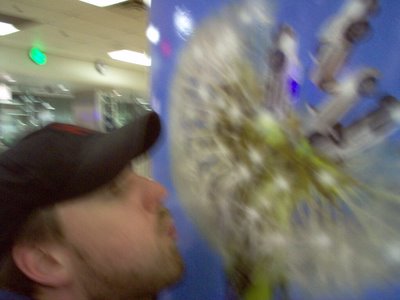It's not that he can't afford to buy a ham and cheese baguette -- the 50-year-old public television star and best-selling author runs a $31 million dollar travel business -- he just likes to save time and money.
It's part of a travel aesthetic he's refined and marketed to an audience of baby boomers eager to experience Europe the Rick Steves way: through the back door. Familiar with his TV shows -- in heavy rotation on PBS -- they are drawn in by Steves' efforts to find new, unspoiled places, his friendly and approachable persona and his commonsense, affordable approach to travel.
"I've got an efficiency and a guerrilla approach ... plus a unique synergy where everything I do helps everything else because it's overlapping," Steves said.
The operations of his company, Europe Through The Back Door, are built to work together: Tour guides update travel books; book research leads to TV scripts; TV shows and a new radio show bring in new customers.
Steves takes no money for the shows he produces for public TV and radio. But he bristles at the notion that he's using public broadcasting as a marketing platform.
"I'm just a travel writer trying to get more horse power, more amplification," Steves said.
But the affluent, educated and often liberal viewers and listeners of public broadcasting closely match his target customers.
"It is advertising," said Gary Erickson, a marketing professor at the University of Washington. "He's selling his books. He's a good spokesperson for his products."
Early passion for exploring Europe
Steves said he measures success in the number of trips he positively impacts, not in dollars. He said he wants to help the 12 million Americans who travel to Europe each year do so efficiently, affordably and with more meaning. He doesn't belong to major travel industry associations and turns down underwriters if they don't align with his values.
He passed on a deal with Visa because they wanted him to only recommend restaurants that exclusively accepted their credit cards, Steves said. Another deal fell through, he said, because the sponsor was afraid of Steves' liberal politics.
"I have a responsibility to be a good citizen and to be outspoken," he said. "And not to worry about someone who doesn't want to use my guidebooks."
He's criticized the Bush administration's foreign policy and promotes the legalization of marijuana.
Steves found his passion for Europe as a young man, touring with a backpack and a few bucks.
In his 20s, he started teaching a class about traveling to Europe on a budget at the University of Washington. By the early 80s, Steves was leading minibus tours, a half-dozen people at a time.
Just last year, his Edmonds-based company, Europe Through the Back Door, took about 8,000 visitors to Europe.
His guide books evolved out of the class and tour handout materials. Packed with itineraries and chapters on where to stay, what to see and where to eat, the mimeographed handouts started disappearing.
"Decent people were being driven to theft to get that information," he said.
Now, Steves has more than 30 titles and Amazon.com lists his titles at the top of almost any travel book list.
Unlike other travel-book authors who update their books by calling, faxing or e-mailing hotels and restaurants, Steves said he and his staff visit each location to taste the food, check the mattresses and look to see if the bathrooms are still clean.
TV, radio shows
From the guide book research, Steves realized he had rich material to produce a series of television shows.
Today, Steves, with his signature glasses, backpack and moppish head of blond hair, has become a fixture on the PBS stations where the show has aired for 15 years. It is seen on 312 stations reaching 95 percent of U.S . markets.
He's extending his public broadcasting reach with a new, hour-long radio show, aired in 17 markets. The show -- what Steves hopes will be the travel equivalent to Car Talk, the popular call-in automative program -- set a new record for the amount of Saturday afternoon listeners at KUOW, the public radio station in Seattle where the show debuted.
"On the face of it, this is a project that could be really valuable to local public radio stations and really appealing to public radio listeners," said Israel Smith, a public radio consultant.
Steves reaches fans like music teacher Carla Rutschman, 59, of Bellingham, a self-proclaimed "Ricknik" who travels to Europe about twice a year.
She owns all of his TV shows and recently donated $150 to her local PBS station to get an advanced copy of Steves' "European Christmas" special. She's not alone.
Steves' has become a mainstay of public television fundraising and regularly travels the country to appear on pledge drives.
"I want to be a cash cow for public broadcasting," he said.
Tom Doggett, vice president of TV programming for Oregon Public Broadcasting, said Steves ranks among the top three fundraisers.
Steves is looking for even more ways to amplify his vision. Along with the radio show, he's just produced a series of podcasts, free, downloadable audio files, featuring tours of the Louvre and other Parisian destinations.
If anything, Steves' legions of fans may have followed him too closely.
Visitors to the tiny Italian coast towns in Cinque Terre may not find Italians eating in the charming restaurants Steves talks about. Instead, they may find a room filled with American tourists, their Rick Steves guidebooks tucked under their arms.
But Steves already is planning his next trip to Europe this summer. He'll likely be stealing lunch from breakfast before setting out to look around corners, test mattresses and find the latest undiscovered town.
"It's a wonderful way to spend your days," he said.
Copyright 2006 The Associated Press. All rights reserved.This material may not be published, broadcast, rewritten, or redistributed.

No comments:
Post a Comment